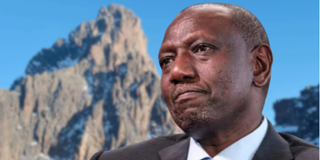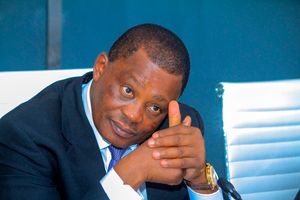
President William Ruto and the politics of Mount Kenya region.
President William Ruto, at the weekend, wrapped up a six-day tour of Mount Kenya, where he appeared to accept that his 2027 re-election bid is a roll of the dice.
"I am ready for the electorate’s verdict. If they say I am fit to continue serving them, we will go on, but if they find me unfit, I will go home, become a farmer, and there is no problem," President Ruto told crowds in Nyeri and Kiambu counties on Saturday.
From a man of the moment in 2022 to a politician with mathematical chances halfway through his first term, political pundits are at pains to explain where the rain started to beat President Ruto.
"When Dr Ruto survived the onslaught of the incumbent President Uhuru Kenyatta, the deep state and the system to narrowly defeat Mr Raila Odinga both at the ballot box and the Supreme Court, I was convinced that nothing but natural attrition would stop him from serving as our president for 10 uninterrupted years," says former Laikipia MP Ms Cate Waruguru.
But Ms Waruguru says her earlier conviction is today dented, "and I am certainly sure that another wonder of the world will be President Ruto winning a second term".
Ruto’s rise from humble beginnings - in a family that even to date not many can recite the names of his parents and siblings - to stardom is portrayed by his admirers as an invincible conquest.
"That is the desire of every marketer and brand manager - capturing the mind of the market, conquering and dominating it. Dr Ruto had done his groundwork well and it was, it is... his moment," says marketing consultant, Ms Cecilia Munga.
Born on January 21, 1967, to Daniel Cheruiyot and Sarah Cheruiyot, Ruto's story has so far been that of scaling even the unimaginable heights.
Ms Munga says: "Ruto gained critical trust in the political, social and economic spheres from his teenage years... and became a master at defying market forces."
"The moment he broke the 2022 presidential deadlock to defeat an incumbent's preferred successor, the deep state and the system, and was declared the most powerful man in the country, his inspirational story became magnetic," she adds.
Dr Ruto was sworn in as president on September 13, 2022, before an ecstatic crowd and carrying the goodwill of an inspired support base.
Although President Ruto's loyalists, led by Kapseret MP Mr Oscar Sudi, believe he is harshly judged, his critics argue the Head of State is the author of his imminent 2027 downfall.
"President Ruto is not fit to serve as president...Not because of anything else but his hatred for institutions, disdain for independent thought and love for constitutional shortcuts to force his way to quick wins," says former Public Service Cabinet Secretary Mr Justin Muturi.
But President Ruto’s loyalists paint a picture of a man who is misunderstood, misjudged and wrongly profiled.
"I can defend Dr Ruto that he is a clean-hearted man whose single desire is to serve. He is a man of unique intelligence and instincts," says Laikipia East MP Mwangi Kiunjuri.
"I have seen the president's heart mourn seeing things written or being said about him that are out rightly propaganda for competitive politics but not a reflection of who he is," he adds.
"This is a president we are going to see out of State House in 2032 with a sense of regret that we have been unfair to him," Mr Kiunjuri asserts, suggesting that his re-election in 2027 is guaranteed. "Wait and see the results of his transformational leadership, which will start paying dividends in 2026."
As the pro- and anti-Ruto camps square off ahead of 2027, the inspirational narrative that has been woven around President Ruto and on which he rode to power has been diluted.
His critics say this myth has been shattered by the ills bedeviling his administration, questioning how, within two years, it has become synonymous with abductions, extrajudicial killings, enforced disappearances and persecution of dissidents - vices he vowed would end under his watch.
And critics also question how President Ruto can run a government synonymous with draconian taxes introduced in the face of public disapproval, and the speed with which he is falling out with allies who brought him to power, including his former deputy Rigathi Gachagua.
"Ruto's overconfidence made him a one-man show, turned into a ruthless dictatorship, and today is a sad reflection of the man we voted for," Mr Gachagua said recently in Kajiado. "I am sorry that I was part of making him president," the former deputy president said.
"This happened when the president stopped listening to expert and honest advice. Instead, he started relying on his own ill-considered advice, others became afraid to tell him the truth, and the end result is what we are seeing," Mr Muturi argues.
President Ruto has set out to ambitiously rewrite the country's history by making almost everything new. He moved the country from the National Health Insurance Fund (NHIF) to the Social Health Authority (SHA), changed the funding model for university education, redesigned the State House and plotted to dominate the African Union Commission by single-handedly pushing for the election of his arch-rival Raila Odinga as chairman in an unsuccessful campaign. Most of these new projects have been plagued by glitches.
He first turned to his new alliance with Mr Odinga to muster the numbers to impeach his deputy, Mr Gachagua, in Parliament, and then invited the ODM leader and his allies to share the executive spoils in a broad-based government.
"We really loved President Ruto. I can't even say what exactly attracted me to him. It was like a spirit. He is a man whose confidence was contagious. We all wanted to be close to him and serve under him in whatever capacity," recalls Murang'a Senator Joe Nyutu.
Mr Nyutu, Mr Gachagua's ally, likened listening to President Ruto speak at the time to visiting a "confidence filling station". "We strongly believed in him. A man who is religious, does not take alcohol, loves culture... in short, this was the leader we had been praying for all along," he says.
Pointing to the President's persuasive manner during the 2022 campaign, long-serving administrator Joseph Kaguthi says if Kenya were at war, Dr Ruto "would have managed to convince the majority to enlist for free".
Mr Kaguthi says this is the goodwill the country needed to mobilise to rebuild a country burdened by debt, divided by tribalism, ravaged by crime and on the brink of economic collapse.
"Our president came in a friendly manner and showed confidence that he was up to the task... that he was the timely vaccine for all the frustrations we had had since independence and that our time to become an African economic tiger was now," he says.
Mr Kaguthi says he was amused to see youngsters who had been born when Dr Ruto was already 40 years old equating him with a freedom fighter.
"I'm not exactly sure how Dr Ruto managed to convince these youngsters that freedom fighters are those who confronted Mr Kenyatta and Mr Odinga. They were convinced that hustlers meant self-rule and dynasties meant colonialism," he recalls.
Mr Kaguthi says the country was fairing well until that confidence became overzealous, extreme and sometimes, reckless.
"The Finance Bill 2024 was the turning point in Dr Ruto's inspirational story. The Bill demolished all the hard work he had applied in building himself as a hardy brand," says political scientist Mr John Okumu.
Mr Okumu adds that the Gen Z uprising served the country well.
"The uprising made the country get to its factory reset, and fans started looking at their president from a perspective of reality. The hypnotisation was gone. We started seeing well out of our earlier blindness, and as we stand, Ruto's reelection is a big gamble that can only be confirmed if indeed it happens," he says.
But the president’s defenders say he is being unfairly crucified. National Assembly Majority Leader Kimani Ichung'wa has defended the government as "focused in the midst of a storm".
Mr Ichung'wa, who accompanied the President on his Mt Kenya tour, said repeatedly that "focus is what drives President Ruto". "He is compassionate, strives to do what is right and lasting rather than looking for quick fixes... it is up to you to like or hate him," he said.
During the tour, Deputy President Kithure Kindiki said, "This is a president on a trajectory of winning our hearts and minds owing to his inspiration, mentorship, focus and love for improved quality of life.”
Mr Ichung'wa said that "President Ruto had to tax people to save the country and the confidence he had has paid off and we are off the debt cliff with a savings of more than Sh140 billion that we will use to make this country a big construction site as roads and buildings get built".









